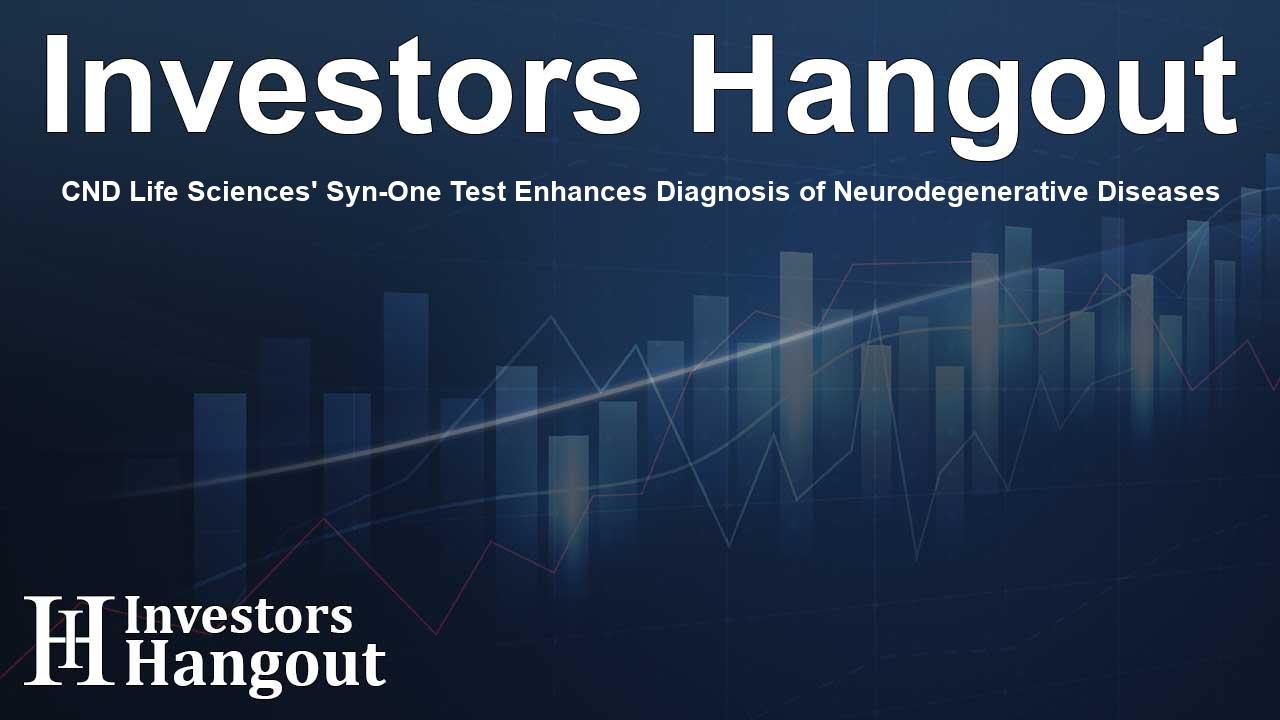CND Life Sciences' Syn-One Test Enhances Diagnosis of Neurodegenerative Diseases

CND Life Sciences’ Breakthrough in Neurodegenerative Disease Testing
CND Life Sciences, a prominent medical technology company, recently made significant strides in the diagnosis of neurodegenerative diseases with the announcement of a study highlighting the Syn-One Test. This revolutionary approach leverages skin biopsies to detect abnormal synuclein, a key marker in conditions like Parkinson's disease and related disorders. Findings from a retrospective chart review revealed that for more than 75% of patients with suspected Parkinson's disease, the Syn-One Test led to changes in clinical diagnosis or treatment.
The Challenge of Accurate Diagnosis
Diagnosing neurodegenerative diseases has long been a complex and challenging task. Traditional diagnostic methods often result in delays or misdiagnoses. The new publication in the Movement Disorders section of Frontiers in Neurology emphasizes the clinical utility of the Syn-One Test, illustrating its effectiveness in identifying synucleinopathies such as Parkinson's disease, dementia with Lewy bodies, and multiple system atrophy. These diseases require prompt diagnosis to initiate appropriate treatment and improve patient outcomes.
Insights from Medical Experts
Dr. Todd Levine, the Chief Medical Officer at CND Life Sciences, explains that neurologists have needed a straightforward, reliable test for diagnosing related disorders. The study reinforces that by examining skin nerves through the Syn-One Test, healthcare providers can significantly enhance their clinical practices and decision-making capabilities. The results show that 78% of patients experienced changes in their clinical care, underscoring the test's potential utility.
Study Findings: Transforming Patient Care
In the study involving 97 patients who underwent the Syn-One Test, a striking 66% showed alterations in their diagnosis, and 55% experienced changes in treatment plans based on the test results. Particularly, those with parkinsonism exhibited the most dramatic shifts, highlighting the indispensable role of this testing method in clinical settings. This advancement has the potential to improve patient care pathways and enrich treatment planning.
Addressing the Patient Experience
Dr. Jonathan Ross Isaacson, who led the study, emphasized the often challenging diagnostic journey faced by patients. The Syn-One Test can illuminate pathways to accurate diagnoses, facilitating timely referrals to specialized medical practitioners and rehabilitation services. With advancements in diagnostic technology, CND Life Sciences is paving the way for improved patient experiences and outcomes.
Enhancing Accessibility of Diagnostic Tools
The Syn-One Test's protocol requires only a small punch biopsy performed in an office setting, making it a convenient option for both patients and physicians. Improved access is crucial, considering the shortage of specialists in movement disorders. By making this simple test widely available, CND Life Sciences aims to expedite early-stage diagnosis of neurodegenerative diseases.
The Importance of Innovative Biochemical Approaches
Experts including Dr. Roy Freeman, a key author of the study, affirm that using a skin biopsy for alpha-synuclein detection represents a significant leap in diagnostic capabilities for neurodegenerative diseases. This method, when integrated into standard clinical practice, can greatly increase diagnostic accuracy and facilitate patient referrals for specialized care.
About CND Life Sciences
CND Life Sciences is dedicated to transforming the care of patients at risk for neurodegenerative diseases. Their laboratory, accredited and certified in several rigorous standards, develops innovative diagnostic solutions like the Syn-One Test. This test employs advanced immunofluorescence techniques to identify phosphorylated alpha-synuclein in patient samples, providing critical insight into synucleinopathies and aiding clinicians in their diagnostic evaluations.
Frequently Asked Questions
What is the Syn-One Test?
The Syn-One Test is a diagnostic tool developed by CND Life Sciences that uses skin biopsies to detect abnormal forms of alpha-synuclein, which are indicative of certain neurodegenerative diseases.
How effective is the Syn-One Test?
Recent studies show that the Syn-One Test has transformed diagnoses for approximately 78% of patients, leading to significant changes in clinical care.
What diseases does the Syn-One Test assist in diagnosing?
It primarily assists in diagnosing Parkinson’s disease, dementia with Lewy bodies, and multiple system atrophy.
Why is early diagnosis important in neurodegenerative diseases?
Early diagnosis is crucial for timely intervention, which can greatly enhance the quality of care and potentially improve patient outcomes.
Where can more information about CND Life Sciences be found?
For more information about their services and research initiatives, you can visit CND Life Sciences’ official website.
About Investors Hangout
Investors Hangout is a leading online stock forum for financial discussion and learning, offering a wide range of free tools and resources. It draws in traders of all levels, who exchange market knowledge, investigate trading tactics, and keep an eye on industry developments in real time. Featuring financial articles, stock message boards, quotes, charts, company profiles, and live news updates. Through cooperative learning and a wealth of informational resources, it helps users from novices creating their first portfolios to experts honing their techniques. Join Investors Hangout today: https://investorshangout.com/
Disclaimer: The content of this article is solely for general informational purposes only; it does not represent legal, financial, or investment advice. Investors Hangout does not offer financial advice; the author is not a licensed financial advisor. Consult a qualified advisor before making any financial or investment decisions based on this article. The author's interpretation of publicly available data shapes the opinions presented here; as a result, they should not be taken as advice to purchase, sell, or hold any securities mentioned or any other investments. The author does not guarantee the accuracy, completeness, or timeliness of any material, providing it "as is." Information and market conditions may change; past performance is not indicative of future outcomes. If any of the material offered here is inaccurate, please contact us for corrections.